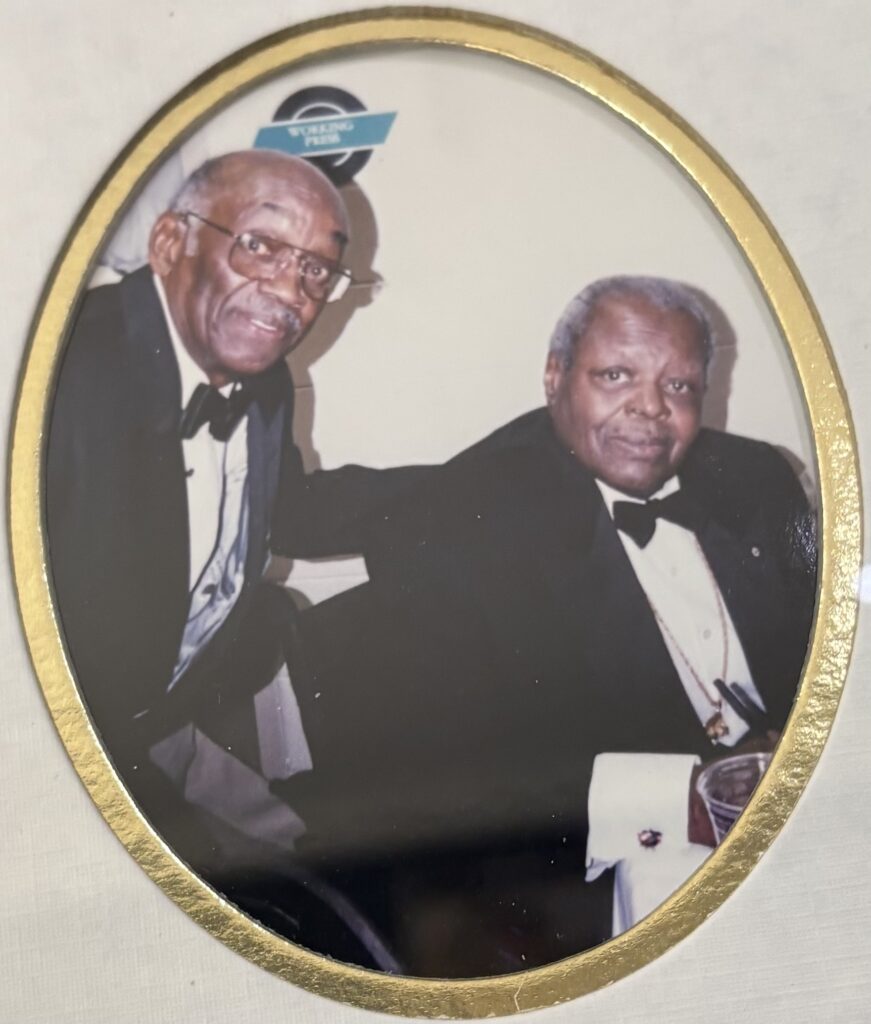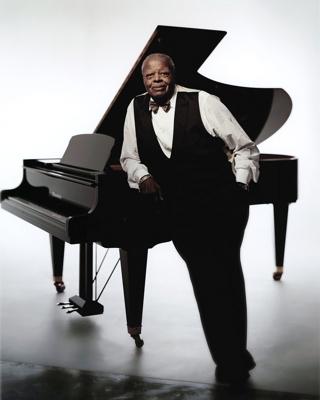TONIGHT! At Chicago’s Symphony Center!
An all-star performance of Oscar Peterson’s Africa Suite featuring original arrangements by John Clayton! With stellar musicians Benny Green, Christian McBride, Dan Wilson, Lewis Nash, and the Chicago Jazz Orchestra under the direction of John Clayton, this promises to be an evening you won’t soon forget.
Along with celebrating OP’s Centennial, the evening is dedicated to the loving memory of the great guitarist, Russell Malone, who was originally scheduled to participate.
To commemorate OP’s Centennial in my own way, here is the brief report I posted following the Oscar Peterson Memorial Concert in 2008:
[a brief report filed January 13, 2008]
A free-admission memorial concert for Oscar Peterson was held at Roy Thomson Hall in Toronto yesterday, Saturday, January 12, 2008. People began queuing up before dawn, and when the show began shortly after 4pm, all 2,630 seats were full and hundreds of fans had been turned away. John and I were among the privileged.

The presentation, titled “Oscar Peterson – “Simply the Best,” was broadcast on Canadian Radio. Canadian television host and journalist Valerie Pringle was mistress of ceremonies and she set the stage, so to speak, for listeners at home. First she described the huge video-projected picture of smiling Oscar looking down from center stage — his smile was remarked upon by almost everyone who spoke. Then she identified the lonely piano set off to the side, stage right, as Oscar’s Bösendorfer, and next to it a huge poster of Oscar waving to an audience with one hand, while his other hand held tight to the hand of his then five-year-old daughter Celine.
While many jazz fans maybe aware of Oscar’s humanitarian interests and fierce beliefs in justice and equality, many might be surprised at how many political friends he had. These people were not just fans, they were actually break-bread friends of long-standing. Oscar was a Companion of the Order of Canada and a member of the Order of Ontario, the most prestigious official honour in the province given in recognition of the highest level of individual excellence and achievement. Two friends, who were also fellow members of The Order, on hand to speak eloquently in memory of Oscar were The Hon. Bob Rae, former Premier of Ontario, and Phil Nimmons, Canadian jazz clarinetist, composer, bandleader, and Director Emeritus of Jazz Studies at University of Toronto.
I’m not well-versed in Canadian protocol, but I’m pretty sure that the highest-ranking official on stage was Haiti-born Her Excellency the Right Honourable Michaëlle Jean, Governor General and Commander-in-Chief of Canada, flanked by a uniformed attendant who escorted her on stage, placed her papers on the podium and stood behind her at attention until she concluded her remarks which were lengthy and alternated between English and French, then he gathered her papers and followed her off stage.
Quincy Jones reminisced lovingly of his early days and antics with Oscar, and the audio taped message from Stevie Wonder was sweet, but perhaps the most touching verbal tribute was given by Oscar’s youngest daughter Celine, now a poised young lady of 16. She spoke of her dad as only a daughter can, remembering the giggles he could evoke from her by donning her high-heeled shoes and an item or two of her apparel, and reliving her myriad travels abroad as she joined Oscar on tour, eating the best foreign foods and hanging with dad and his friends after concerts, long past-bedtime and into the wee hours of the morning.
The first music to be heard on the program was from Oscar himself — a video clip of the Oscar Peterson Trio with Niels Henning Oersted Pedersen on bass and Ulf Wakenius on guitar. Surely a tough act to follow, but the quartet with Monty Alexander (piano), Ulf Wakenius, Dave Young (bass) and Jeff Hamilton (drums) truly rocked the house.
Other musicians paying tribute include Hilary Kole (singer billed as Oscar’s protege), Audrey Morris, a jazz balladeer from Chicago, and Montreal entertainer Gregory Charles. Herbie Hancock wished Oscar well on his next voyage and serenaded him on his way with a solo meditation on “Maiden Voyage.” Nancy Wilson, accompanied by Monty Alexander, sang “Goodbye” (Gordon Jenkins):
I’ll never forget you
I’ll never forget you
I’ll never forget how we promised one day
To love one another forever that way
We said we’d never say
Good-bye
Nobody who I have ever loved has left,” Nancy said. “They are always here.”
The tribute ended with a Oscar’s “Hymn to Freedom” featuring renowned soprano Measha Brueggergosman with the combined forces of the Faith Chorale, the Nathanial Dett Chorale and the University of Toronto Gospel choir all under the direction of pianist and CBC Radio host Andrew Craig.
Although I never felt that I knew Oscar well, I did have slightly more than a passing acquaintance and I was especially honored when he asked me to write the liner notes for the recording of his commission “Trail of Dreams: A Canadian Suite.”
There is an identifiable Oscar Peterson sound, recognizable but not categorizable. His original style does not fall easily into any specific idiom and he likes it that way. “I just do what I do and I don’t categorize myself in one category or another.” He is even reluctant to accept the title of composer. “Well I don’t pretend to be Berlioz or Haydn or Ellington,” he demurred…
I was not on hand when the suite premiered on April 11, 2000 in Roy Thompson Hall, but it felt fitting that I was there, in that very same concert hall, to pay my respects.
Click here to read the liner notes.

